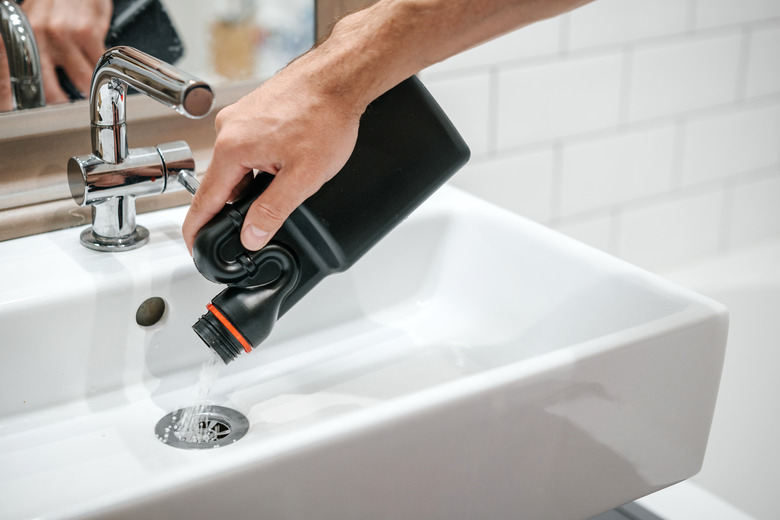What Household Products Contain Sulfuric Acid?
We may receive a commission on purchases made from links.
Once you start reading the ingredient lists on your usual household cleaning products, you may realize that you're being exposed to a lot more chemicals than you realized. Sulfuric acid may or may not be one of them. This highly corrosive acid is commonly used in a variety of industrial processes, and it's only used in a small number of household products. Many households don't have anything that contains sulfuric acid, but if yours does, safe handling is a must.
Tip
Sulfuric acid isn't found in many household products, but it may be included in certain kinds of drain cleaners and in lead car batteries.
Hazards of Sulfuric Acid
Hazards of Sulfuric Acid
It's good to be aware of sulfuric acid in household products because exposure to this potent acid can have devastating health effects. Getting sulfuric acid on the skin may cause irritation or burning. Swallowing any quantity of sulfuric acid can cause life-threatening injury to the lungs and stomach. Exposure to sulfuric acid fumes can burn the eyes and create breathing difficulties among other symptoms. Sulfuric acid poisoning can even be fatal.
Because of the risks associated with sulfuric acid, it's not something you'll find in many household products. Generally, people most need to worry about sulfuric acid exposure if they have certain kinds of manufacturing jobs, regularly handle lead car batteries or otherwise work in an environment where this acid is used. People who do work around sulfuric acid should have received safety training and protective equipment from their employer.
Identifying Household Products With Sulfuric Acid
Identifying Household Products With Sulfuric Acid
Drain cleaners are the most common product in which sulfuric acid will be found in the average household. The acid's corrosive quality helps these products eat through clogs and clear pipes, so it's sometimes an ingredient in heavy-duty drain cleaners. However, sulfuric acid isn't always a key drain cleaner ingredient. Most kinds of drain cleaners you find on your grocery store shelves are made using active ingredients such as potash or lye instead.
The other place where the average person might encounter sulfuric acid is in a lead car battery. The acid helps create the chemical reaction that generates electricity. A lead battery containing sulfuric acid may leak when it gets old, is overcharged or is damaged by extreme weather or external forces. When batteries leak, acid may get on the skin and cause burns or create vapor that's unsafe to breathe.
Handling Products With Sulfuric Acid
Handling Products With Sulfuric Acid
Any drain cleaner or other household product that contains sulfuric acid should be very clearly labeled. If your household does include any of these products, it's critically important to keep them out of the reach of children and pets. Even though these products may contain only a small amount of this acid, they can obviously still be very dangerous if swallowed.
Never combine anything containing sulfuric acid with bleach or any other chemicals. Exercise extreme caution and use ventilation when you use sulfuric acid for drain cleaning. If you've already tried another kind of drain cleaner and it didn't work to remove a clog, don't immediately pour drain cleaner containing sulfuric acid down the drain, or it may react with bleach or other chemicals that were in the first drain cleaner.
If you need to dispose of a drain cleaner containing sulfuric acid, never put the container in the trash while it still contains any liquid. The safest way to get rid of it is generally pouring it down the drain and following later with lots of water. Carefully read the package directions first to make sure it's safe for use with your kind of pipes. Alternatively, contact your municipality's hazardous waste disposal program for specific guidance on where to take leftover drain cleaner.
Don't handle a leaking car battery unless you're wearing protective eyewear and thick rubber gloves. If you need to dispose of a lead battery that's leaking acid, transfer the battery to a sealed plastic bag and contact your local car battery retailer for next steps. These retailers are required to accept used car batteries so they can be safely recycled.
